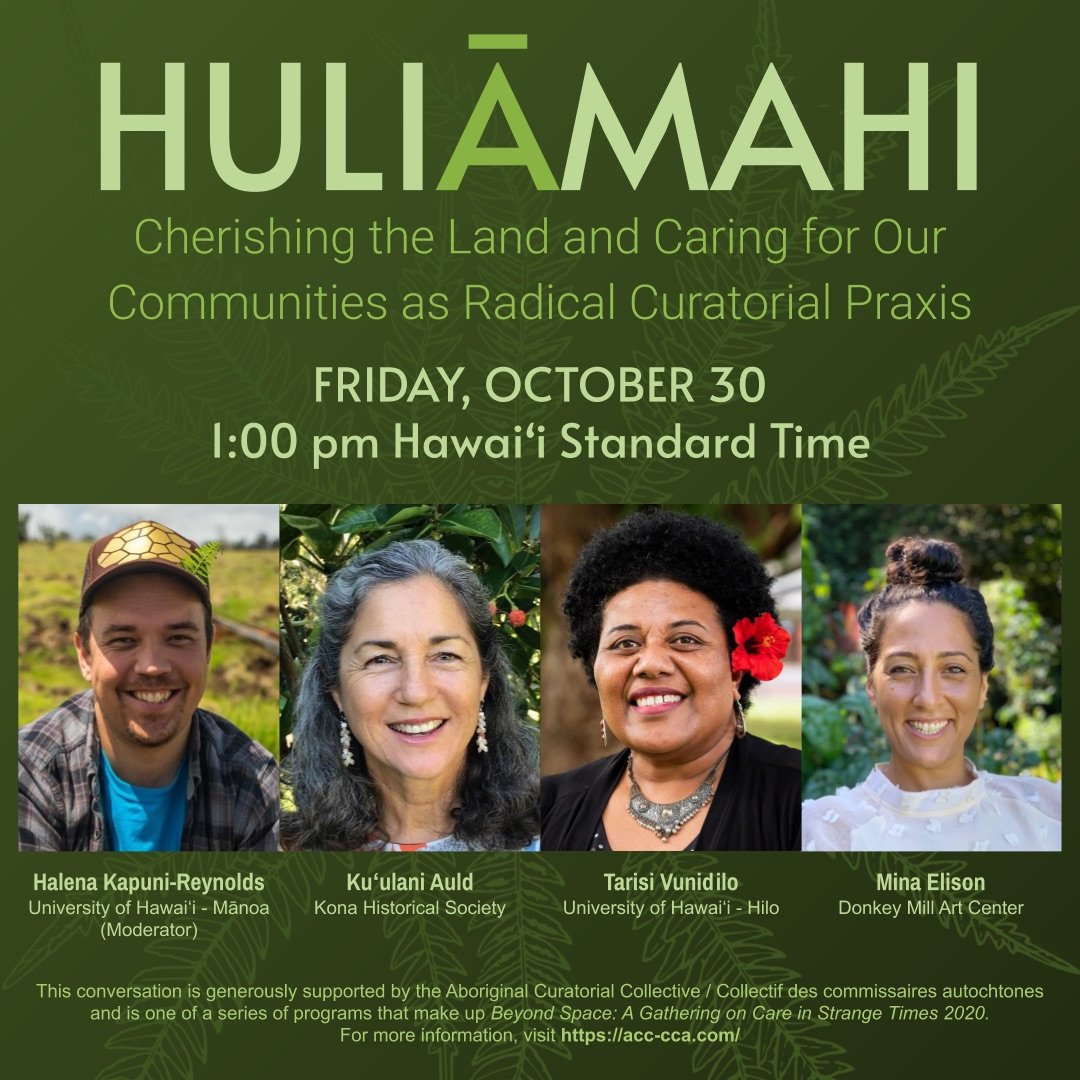
01 Oct HULIĀMAHI: Cherishing the Land and Caring for Our Communities as Radical Curatorial Praxis
DATE: Friday, October 30, 1:00pm HST on Zoom
To join the panel, click on this Zoom link: https://us02web.zoom.us/j/82929383180
Meeting ID: 829 2938 3180
Huliāmahi (pronounced who-lee-ah-muh-hee). To join together in great numbers. To cooperate. To overflow as a river. To be full of water. To collectively turn our hands (huli) towards the earth to work the land for nourishment (mahi).
The word “huliāmahi” in ka ʻōlelo Hawaiʻi, the Indigenous tongue of Kanaka ʻŌiwi (Native Hawaiians), reminds us that many hands make for little work, whether that be preparing loʻi (wetland terraces) for the planting of kalo (taro), or the numerous hands that it takes to develop exhibits, orchestrate massive collections relocation projects, and manage large educational programs. Huliāmahi also reminds us of the importance of connecting to the land and sea by forming intimate relationships with places, whether that is through growing food for ourselves and our families, or by visiting wahi pana (storied places) throughout our lifetimes. Join us as we discuss how our place-based connections enrich our work as museum scholars and practitioners. We assert that those institutions who are willing to decolonize or Indigenize must also reckon with the lands and place-based knowledges and histories that their institutions are literally built on.
Bios
Moderator
Halena Kapuni-Reynolds was born on Hawaiʻi Island and raised in the Hawaiian homestead community of Keaukaha and the upper rain forest of ‘Ōla‘a. Currently, he is a doctoral student in museum studies and American studies at the University of Hawaiʻi-Mānoa, and serves as the graduate assistant for the Museum Studies Graduate Certificate Program. He has co-organized a range of museum-related events in Honolulu, including “Seeding Authority: A Symposium on Museum Decolonization” (2018) and a series of material culture/object interpretation workshops in partnership with the Hawaiʻi Mission Houses Historic Site and Archive (2019). As a board member of the Hawaiʻi Museums Association, he is currently organizing a series of webinars on cultural competence in Hawaiʻi’s museums. He also sits on the board of the International Institute for Indigenous Resource Management, located in Denver, Colorado.
Panelists
Kuʻulani Auld is a kamaʻāina (child of the land) of Kona whose family for generations has lived and farmed in the ahupuaʻa of Kawanui and Lehuʻula. Currently, Kuʻulani serves as the Programs Director for the Kona Historical Society, where she develops programs in consultation with community members that honor Kona’s multi-ethnic heritage and inspires both kamaʻāina and malihini (visitors). She assisted with documenting and researching the Tax Records, from 1859 – 1890, of the Kingdom of Hawaiʻi, enabling a better understanding of the daily lives of citizens, in Kona, and received a Historic Hawaiʻi Preservation Award in 2018 for the preservation of the D. Uchida Farm House, which was built in Kealakekua in 1925. Kuʻulani graduated from Kamehameha High School on Oʻahu in the ahupuaʻa of Kapālama and studied Business Administration at the University of Hawaiʻi at Hilo.
Mina Elison was born and raised in Kailua on the island of O‘ahu. With generational ties to South Kona on Hawai‘i, Mina resides in her family home in Keʻei. Mina currently serves as the Communications Director & Curator for the Donkey Mill Art Center, located in the ahupuaʻa of Keauhou on Hawaiʻi Island. She previously held the position of Museum Curator at the Kona Historical Society where she curated a wide range of thought-provoking exhibitions which aimed to amplify stories of the community. Mina has B.A. in Anthropology and French from the University of San Diego and earned an M.A. in Museum Studies from New York University in 2008. She has served on the Board of the Association of Hawai‘i Archivists and has worked to create programs connecting communities with collections on Maui, O‘ahu, Kaua‘i, and Hawai‘i.
Tarisi Vunidilo was born and raised in Suva, Fiji. She is an Assistant Professor in Anthropology at the University of Hawaiʻi at Hilo, where she teaches courses on Pacific and Indigenous museology. In 2016, Tarisi received her Ph.D. in Pacific Studies from the University of Auckland after successfully defending her thesis titled “iYau Vakaviti-Fijian Treasures, Cultural Rights and Repatriation of Cultural Materials from International Museums.” Prior to her appointment at UH-Hilo and throughout her career, Tarisi has held positions at Creative New Zealand, the Waikato Museum of Art & History, the National Museum of New Zealand Te Papa Tongarewa, and the Fiji Museum. She also currently volunteers as Secretary-General for the Pacific Islands Museums Association (PIMA) and works between her office in Port Vila, Vanuatu and Hilo, Hawaii.



No Comments